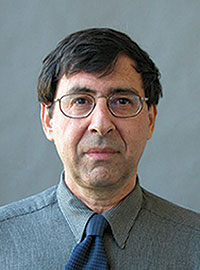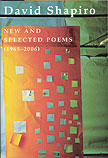|
|
 |
 |
|
BOOKSHELFDavid Shapiro ’68: Four Decades of Poems

David Shapiro ’68 PHOTO: COURTESY OVERLOOK Press  I put it off for many, many years,” says David Shapiro ’68, ’73 GSAS in an interview regarding his new book, New and Selected Poems (1965-2006) (Overlook Press, $21.95). “And I know why,” the poet, who has been writing for most of his life, continues. “When you do a book, it has its architecture, and then as you take things from those books, it’s something else. So you have to pray you’ve created something that works by itself.” Despite such preoccupations, Shapiro’s poetry collection, which ranges in themes from music and love to family and politics, has received positive reviews. In February, The Brooklyn Rail described his poems as “[explaining themselves] fully, citing sources of inspiration, announcing intentions, and guiding us through the chaos of postmodern aesthetic.” Each line of Shapiro’s poetry bears thoughtfulness, from the delicate repetitions in “You Are The You” (“Lights of all kinds I traced/You and you and you and you”) to the bittersweet protests hidden in “Man Holding An Acoustic Panel” (“It’s sweet to the sweet/always carrying a brunt/for that sacred top/In man it’s self-willed/perpetually giving a shake”). 

New and Selected Poems (1965–2006) Shapiro grew up in Deal, N.J., in a family with several artistic influences — his father was a sculptor and his grandfather, Berele Chagy, a well-known Jewish cantor — and began playing violin and writing poetry at a young age. He was accepted into the College at age 16, partially due to the help of the late poet and professor Kenneth Koch, who had met Shapiro and seen his work. After taking a year off to play music and write, Shapiro enrolled in the College and published his first book of poems, January, in his first year. As a student, Shapiro was involved in the ’68 protests (and famously photographed in the president’s seat in Low Library). “I was the Kellett Fellow, and I was very scared that I would lose it, lose this, lose that, and we took a certain risk,” he says. Within the Columbia community, Shapiro found inspiration and support in his professors, including Fred Dupee and Meyer Schapiro ’24. “Schapiro was willing … to be a positive critic,” Shapiro remarks. “He was a great supporter of me professionally — got me jobs, left me books on my desk. I was very lucky to be at Columbia when there was this genius at Columbia.” Shapiro also remained close with Koch, who had mentored him throughout his career. Shapiro, in turn, helped Koch get published near the end of his life. “I had been his friend, but I loved the idea that I could help him,” Shapiro states. “He said, ‘Finally, you are helping me!’ ” Shapiro notes several other influences on his work, ranging from Willem de Kooning to Wallace Stevens and John Cage. Perhaps one of the most sentimental influences on his poetry, however, has been his son, Daniel ’07, also a published poet who has been writing since early childhood. “One of the things that I tried to do was spend a lot of time with him, and when I realized that I was regretting not practicing [violin] or writing, I thought, ‘I’ll write poetry with him,’ ” Shapiro says. New and Selected Poems includes two poems Shapiro wrote with his son when he was a child. “Once he was angry with me,” Shapiro says of his son, “I believe he was 10, and he said, ‘You are the boss of God?’ … and I said, ‘That’s a great line … wait, wait, we’ll [write] it upstairs, it’s too good!’... At the end, he said, ‘I am the boss of this poem. I wrote it.’” Shapiro graduated with a B.A. in English and studied Greek tragedy and English literature at Cambridge for two years under the Kellett Fellowship, earning an M.A. with honors. He returned to Columbia for his Ph.D. in English and comparative literature, writing his dissertation on poet John Ashbery ’50 GSAS. He taught English at Columbia for nine years (1972–81), and has taught poetry and literature at the Cooper Union School of Architecture since 1980. Shapiro also has taught art history at William Paterson College since 1985, where he is tenured as an art historian; in the visual arts department at Princeton; and in the English/creative writing program at Brooklyn College. Shapiro was a National Book Award nominee in 1971 for his book of poems, Man Holding an Acoustic Panel, and has won fellowships from the National Endowment for the Humanities (1979–80) and National Endowment for the Arts (1980). Aside from poetry, he has written books about poets and artists, including Ashbery, Jim Dine and Jasper Johns. Shapiro, who lives in Riverdale, N.Y., with his wife, architect Lindsay Stamm Shapiro ’70 Barnard, and their son, has no intention of resting. “Yes, I feel that I am 100, but I don’t look my age!” he says with a smile, listing plays, novels and more books about artists and philosophy as possible projects. “When I was young for so long — I was constantly conscious [of age] when I was 5 and 6 and 7 and 8 and 9 — as a violinist, you’re finished in certain ways when you’re 17 or 20. But then, I think now that I won’t be done.” Maryam Parhizkar ’09
|
|
||||||||||||||||||||||||||||